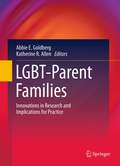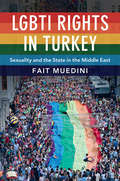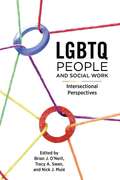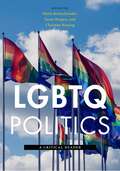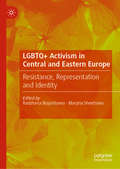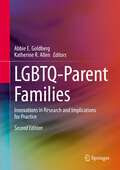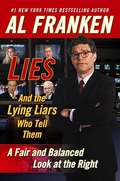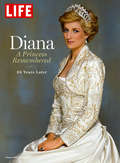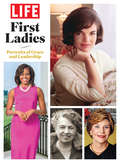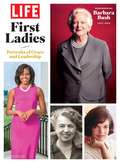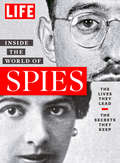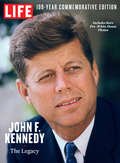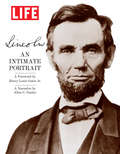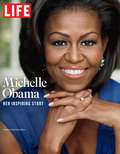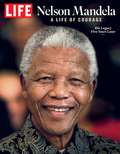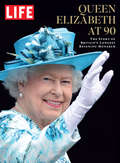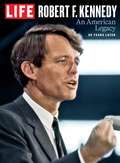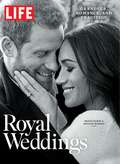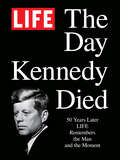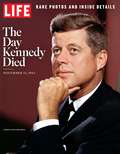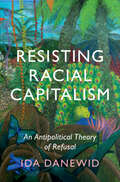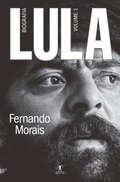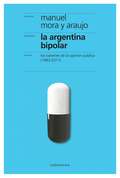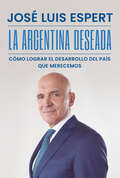- Table View
- List View
LGBT-Parent Families: Innovations in Research and Implications for Practice
by Abbie E. Goldberg Katherine R. AllenLGBT-Parent Families is the first handbook to provide a comprehensive examination of this underserved area. Reflecting the nature of this issue, the volume is notably interdisciplinary, with contributions from scholars in psychology, sociology, human development, family studies, gender studies, sexuality studies, legal studies, social work, and anthropology. Additionally, scholarship from regions beyond the U.S. including England, Australia, Canada, and South Africa is presented. In addition to gender and sexuality, all contributors address issues of social class, race, and ethnicity in their chapters.
LGBTI Rights in Turkey, Part 1: Sexuality and the State in the Middle East
by Fait MuediniThe LGBTI community in Turkey face real dangers. In 2015, the Turkish police interrupted the LGBTI Pride march in Istanbul, using tear gas and rubber bullets against the marchers. This marked the first attempt by the authorities to stop the parade by force, and similar actions occurred the following year. Here, Fait Muedini examines these levels of discrimination in Turkey, as well as exploring how activists are working to improve human rights for LGBTI individuals living in this hostile environment. Muedini bases his analysis on interviews taken with a number of NGO leaders and activists of leading LGBTI organisations in the region, including Lambda Istanbul, Kaos GL, Pembe Hayat, Social Policies, Gender Identity and Sexual Orientation Studies Association (SPoD), and Families of LGBT's in Istanbul (LİSTAG). The original information provided by these interviews illuminate the challenges facing the LGBTI community, and the brave actions taken by activists in their attempts to challenge the state and secure sexual equality.
LGBTQ People and Social Work: Intersectional Perspectives
by Brian J. O'Neill Tracy A. Swan Nick J. MuleThis unique edited collection addresses issues impacting the well-being of LGBTQ individuals with diverse identities to help students, practitioners, educators, and policymakers work with sensitivity and strength in the LGBTQ communities. Edited by three expert LGBTQ scholars, this engaging book offers a multiplicity of perspectives through the works of practitioners, students, and activists. <P><P>By focusing on intersectionality and its application to social work practice, organizational change, and the pursuit of social justice, this text gives voice to previously silenced members of the LGBTQ community. The contributors of this important collection deepen insight into the diversity of identities within LGBTQ communities and provide many thoughtful recommendations to inform future social work pedagogy, agency policy, and forms of practice in diverse contexts and fields of service. This book is a valuable resource for students in Social Work, Community Medicine, Counselling Psychology, Nursing, Equity Studies, and Gender Studies, as well as anyone engaged in social service work.
LGBTQ Politics: A Critical Reader (LGBTQ Politics #3)
by Marla Brettschneider Susan Burgess Christine KeatingA definitive collection of original essays on queer politics in the U.S. and around the world. From Harvey Milk to Barney Frank to ACT UP to Proposition 8, in the last few decades, no political change has been more significant than the civil rights advancements of LGBTQ citizens. LGBTQ Politics is the first authoritative reader to approach the complexity of queer politics from a political science perspective, bringing together original contributions from leading scholars in the field on key issues of LBGTQ politics. These original essays cover a wide range of essential topics, including marriage equality, transgender discrimination, gay and lesbian political candidates, LGBTQ human rights advocacy, HIV prevention, and LGBTQ movements of the Global South. The volume also includes a number of critical essays that reflect upon the state of political science as a discipline that has struggled to address queer politics. Contributors draw from a variety of subfields in political science, including comparative politics, political theory, American politics, public law, and international relations. Essays that focus on mainstream institutional politics appear alongside contributions grounded in grassroots movements and critical theory. While some essays express concerns that the democratic basis of the LGBTQ movement has been undermined, others celebrate the movement&’s successes and offer visions for the future, A comprehensive, thought-provoking, and authoritative collection, LGBTQ Politics: A Critical Reader is required reading for anyone looking to learn about the politics of sexuality.
LGBTQ+ Activism in Central and Eastern Europe: Resistance, Representation and Identity
by Maryna Shevtsova Radzhana BuyantuevaThis edited collection offers in-depth perspectives into the emergence and development of LGBTQ+ movements in Central and Eastern Europe, including analysis of Estonia, Hungary, Poland, Romania, Russia and Ukraine. The book examines various issues faced by local LGBTQ+ activists, as well as the tactics and strategies which they develop and adopt. The contributors discuss the applicability of Western ideas and concepts to the post-socialist context, considering their ability to fully tackle local nuances and complexities with regards to sexuality and, thus, the dynamics of LGBTQ+ activism. The volume examines differences in the domestic policies of these countries and the consequent effects on LGBTQ+ activism in the region. It also offers important insights into the impact of Western actors in promoting liberal democratic values in the region, and ensuing political and social backlashes.LGBTQ+ Activism in Central and Eastern Europe will be of interest to students and scholars across a range of disciplines, including Gender and Sexuality Studies, Sociology, Anthropology and Political Science.
LGBTQ-Parent Families: Innovations in Research and Implications for Practice
by Abbie E. Goldberg Katherine R. AllenThis textbook offers a comprehensive overview of research on LGBTQ-parent families. The new edition of the textbook provides updated information and expands on the range and depth of current research. The volume features contributions from scholars in psychology, sociology, human development, family studies, gender studies, sexuality studies, legal studies, social work, and anthropology. In addition, the textbook offers an international perspective, with coverage spanning many diverse nations and cultures. Chapters highlight key research, exploring sexual orientation in relation to other key social identities, such as gender, race, and nationality. Chapters also discuss new, emerging areas of research, including asexuality and immigration. The textbook concludes with a section on the growing sophistication of research methodology in the study of LGBTQ-parent families. The second edition includes new chapters discussing: LGBTQ-parent families and health. LGBTQ foster parents. LGBTQ adults and sibling relationships. LGBTQ-parent families and poverty. LGBTQ-parent families and separation/divorce. LGBTQ-parent families and religion. LGBTQ-parent families and grief/loss. Methods, recruitment, and sampling in research with LGBTQ families. Teaching/pedagogy on LGBTQ-parent families. LGBTQ-Parent Families, 2nd Edition, is a valuable updated resource for graduate students as well as veteran and beginning clinicians across disciplines, including family studies, family therapy, gender studies, public health, social policy, social work and child and adolescent psychology as well as related disciplines across mental health and educational services.
LIES: A Fair and Balanced Look at the Right
by Al FrankenListen to Al Franken as interviewed by Dan Susskind of Another Perspective on VoiceAmerica. com! Get the free Real Player Al Franken, one of our “savviest satirists” (People), has been studying the rhetoric of the Right. He has listened to their cries of “slander,” “bias,” and even “treason. ” He has examined the Bush administration’s policies of squandering our surplus, ravaging the environment, and alienating the rest of the world. He’s even watched Fox News. A lot. And, in this fair and balanced report, Al bravely and candidly exposes them all for what they are: liars. Lying, lying liars. Al destroys the liberal media bias myth by doing what his targets seem incapable of: getting his facts straight. Using the Right’s own words against them, he takes on the pundits, the politicians, and the issues, in the most talked about book of the year. Timely, provocative, unfailingly honest, and always funny, Lies sticks it to the most right-wing administration in memory, and to the right-wing media hacks who do its bidding. .
LIFE Diana: A Princess Remembered
by The Editors of LifeA Princess RememberedEmbrace the lasting legacy of Princess Diana with this keepsake Special Edition, filled with insightful writing and gorgeous photography from the LIFE archives. At her storybook royal wedding in 1981-"The Wedding of the Century"-Diana Spencer seemed the perfect match for Prince Charles, the dashing heir to the British throne. Though their story did not end happily ever after, Diana's talent for truly connecting with people changed the monarchy forever, and her commitment to helping the underprivileged continues to inspire us today. From Prince William and Kate Middleton, to Prince Harry, and even Queen Elizabeth II, England's royal family shows the influence of Diana's bold and brave choices. LIFE Diana offers a touching remembrance of "The People's Princess," 20 years after her tragic death.
LIFE First Ladies: Portraits of Grace and Leadership
by The Editors of LIFEAmericans have always been fascinated with the women who have held the title First Lady. But just who were these people, behind their official portraits? Did you know that one won an Emmy and another held regular radio addresses? LIFE takes a close look at all of these women and their legacy in a volume that's guaranteed to delight and surprise. Highlights includeFirsts, such as the first First Lady to wear pants publicly and the first to drive a carHow Dolley Madison set the stageUnanswered questions: Did one First Lady poison her husband? Did another serve as unofficial commander in chief?Presidential spouses around the world and how their roles differ from the U.S. First LadyEleanor Roosevelt's achievements are well-known, but others quietly accomplished great things in politics
LIFE First Ladies: Remembering Barbara Bush, 1925 - 2018
by The Editors of LIFEAmericans have always been fascinated with the women who have held the title First Lady. But just who were these people, behind their official portraits? Did you know that one won an Emmy and another held regular radio addresses? LIFE takes a close look at all of these women and their legacy in a volume that's guaranteed to delight and surprise. Highlights include:Firsts, such as the first First Lady to wear pants publicly and the first to drive a carHow Dolley Madison set the stageUnanswered questions: Did one First Lady poison her husband? Did another serve as unofficial commander in chief?Presidential spouses around the world and how their roles differ from the U.S. First LadyEleanor Roosevelt's achievements are well-known, but others quietly accomplished great things in politics
LIFE Inside the World of Spies (LIFE Special Issue Magazine): The Lives They Lead. The Secrets They Keep.
by The Editors of LIFEThe truth about espionage goes much deeper than the Bond types that fill our big screen. Mary Queen of Scots, the Man in the Iron Mask, Mata Hari, the Enigma machine, the CIA, Watergate, and WikiLeaks: Spies and spying have rewritten human history and now affect how we all live. With sections on codes and cryptography, moles and double agents, wiretapping, detectives, and even the age-old art of seduction, this fascinating book reveals the true stories of the bold spies who-whether motivated by patriotism, greed, or a love of adventure-risked everything. Rare and remarkable photos from the archives of LIFE magazine, plus illuminating text, make this a compelling read for anyone with an interest in the practiced-and powerful-art of deception.
LIFE John F. Kennedy: The Legacy
by The Editors of LIFECommemorating the centennial of JFK's birth on May 29, 2017, LIFE presents John F. Kennedy: The Legacy, a 100-Year Commemorative Edition. Featuring both rarely seen archival photographs and classic images, the book reflects the lasting influence of the president who helped avert nuclear holocaust, advanced the cause of civil rights, and put America on the moon. Not least, it offers an intimate glimpse of the man-father, husband and son-who was cut down in his prime but whose "one brief shining moment" left a powerful and enduring impression.
LIFE Lincoln: An Intimate Portrait
by Henry Louis Gates Allen C. GuelzoOne hundred fifty years ago, the United States lost its greatest leader. In this commemorative volume, LIFE recounts the life. Our narrative was written by the award-winning Allen C. Guelzo, author of Gettysburg, and Henry Louis Gates Jr. leads us into this stirring story with his moving foreword. Then there are the pictures: photographs, many of them rarely seen, of Lincoln, the Civil War-his life and times.
LIFE Michelle Obama
by The Editors of LIFEThe Editors of LIFE Magazine present LIFE Michelle Obama.
LIFE Nelson Mandela: A Life of Courage
by The Editors of LIFEFrom his youth as the leader of rebels to his years as president and elder statesman of South Africa, Nelson Mandela changed the world through his messages of peace and reconciliation. Rediscover the amazing journey of this inspiring leader in LIFE Nelson Mandela—a photographic biography and Special Edition featuring unforgettable images and insightful text from the editors of LIFE. Follow Mandela throughout his lifelong fight against apartheid and injustice, his 27 years of imprisonment at Robben Island and Pollsmoor, and his triumphant victories as both the first democratically elected president of South Africa and as a Nobel Peace Prize laureate. Dozens of historical photographs show him as a resistance leader with the African National Congress, at his trials, during his time in prison, and in his later years with other world leaders, including Bill Clinton and Desmond Tutu, just to name a few. For decades, readers have turned to LIFE to see, understand, and remember the most important events and people of our time. Let Nelson Mandela show you the remarkable life of an enduring symbol of hope and equality.
LIFE Queen Elizabeth at 90: The Story of Britain's Longest Reigning Monarch
by The Editors of LifeQueen Elizabeth II has been called "A Queen for All Times." At 90 years old, she now has eclipsed Queen Victoria's 63-year record to become Britain's longest reigning monarch. She remains the head of state of the United Kingdom, and a group of 16 nations including Canada, Australia, and New Zealand call her queen, and she is the head of the British Commonwealth which includes another 37 countries, including India and South Africa. Throughout her life, she has enjoyed much happiness including a long and happy marriage to Prince Philip, four children, and Silver, Golden, and Diamond Jubilees. Her reign has also been marked by much sadness, including the failed marriages of three of her children, the deaths of close family members and friends, and the markedly difficult death of Princess Diana, which took a toll on both the Royal Family and the nation.Now Life, in a new special edition, takes a nuanced and thoughtful look at the reign of Elizabeth at 90 and what her over-63 years on the throne have meant for her subjects and the world at large, including her early life, the years of World War Ii, her marriage and family, life ruling Great Britain, Windsor family values and much more.With dozens of stunning photos, stories, and analysis, Queen Elizabeth at 90 is a keepsake of both a life well-lived and an historical time on the throne, as well as a captivating collection for any royal watcher.
LIFE Robert. F. Kennedy: An American Legacy, 50 Years Later
by The Editors of LIFEFifty years after Robert Francis Kennedy's assassination, celebrate his legacy with this special edition LIFE Robert F. Kennedy.
LIFE Royal Weddings: Grandeur, Romance, and Tradition
by The Editors of LIFEA generation ago, hidebound royal traditions would have prevented Prince Harry from marrying his love, Meghan Markle, a divorced American actress. But times are changing, even at Buckingham Palace. Celebrate this new chapter as well as the historic marriages of the British Royal family in this special edition, LIFE Royal Weddings.
LIFE The Day Kennedy Died: Fifty Years Later: LIFE Remembers the Man and the Moment
by The Editors of LifeFifty years ago on November 22, 1963, in Dallas's Dealey Plaza, John Fitzgerald Kennedy, the 35th President of the United States, was assassinated while traveling in a motorcade with his wife, Jacqueline. LIFE magazine, the weekly pictorial chronicle of events in America and throughout the world, was quickly on the scene. The Kennedys had been LIFE's story: Jack and Jackie made the cover in his sailboat before they were married and he was a fresh-faced senator from Massachusetts, and the White House doors had remained open to LIFE throughout his presidency: Cecil Stoughton's photographs of Caroline and John-John in the Oval Office, Jackie's tour of the renovation, tense behind-the-scenes moments during 13 days of the Cuban Missile Crisis--all of this appeared in LIFE. The famous Zapruder film, included here unedited, first appeared in LIFE, after being acquired by LIFE's Richard B. Stolley. Stolley also interviewed at the time Dallas police, Kennedy administration officials, members of the Oswald family, workers at Jack Ruby's bar. Jackie's first conversation after the murder was with Theodore H. White for LIFE, and in it she told the American people, for the first time, about the Camelot her late husband had imagined. All of that is revisited in LIFE The Day Kennedy Died, including: An official release of the unedited Zapruder film An essay by Richard B. Stolley on how he exclusively obtained the iconic film for LIFE An essay by Abraham Zapruder's granddaughter, Alexandra, who writes for the first time about how the film affected her family over the generations Personal stories about where they were when they heard the news from Barbra Streisand, Maya Angelou, Jimmy Carter, Tony Bennett, Willie Mays, Sergei Khrushchev, James Earl Jones, John Boehner, Tom Brokaw, Mikhail Baryshnikov, Alec Baldwin, Bill O'Reilly, Dan Rather and many more Rarely seen photos from the TIME/LIFE archive of Allan Grant's photo essay of the Oswald family on the night of the assassination A foreword featuring a conversation with historian David McCullough LIFE's Theodore H. White's famous "Camelot" interview with Jackie (which she gave shortly after the assassination), as well as the story behind the interview and the words that never ran A new essay on 50 years of conspiracy theories by J.I. Baker, author of The Empty Glass
LIFE The Day Kennedy Died: Fifty Years Later: Life Remembers The Man And The Moment
by The Editors of LIFELIFE Magazine presents The Day Kennedy Died.
LIFE The New Royals
by The Editors of LifeThe aura around the royal family is vastly different than it was in years and decades past. Now, 20 years after the death of the transformative Princess Diana, today's generation of royals are active and engaged, using the power of their position to advance causes for the good of the community. Prince William and Prince Harry, inspired by the example set by their mother, have embraced charities and causes that include mental health and aid wounded veterans. Kate Middleton and her children, little Prince George and Princess Charlotte, are out and about, visible in ways that royals never were before. This is the world that Kate and William's newest child-she is due in early 2018-will enter. The new royals are still glamorous, and now they are more inspiring than ever. LIFE The New Royals highlights the young generations of Windsors with glowing photographs of them, as well as archival photographs of Charles, Diana, the Queen and more, along with rich and thoughtful reporting on one of the world's best-known families. This special edition also includes a family tree of the Windsors and a section on the new generations of royals throughout the world. Packed with dozens of unforgettable images, including the wedding of William and Kate and the latest adorable antics of their children, this is a memorable keepsake for royal watchers everywhere.
LSE International Studies: An Antipolitical Theory Of Refusal (Lse International Studies)
by Ida DanewidLULA, biografia. Volume 1
by Fernando MoraisA história improvável de um homem que se tornou, simultaneamente, símbolo e agente de mudança de um dos maiores países do mundo. Além de juízos ou paixões, Lula da Silva está entre as maiores figuras políticas da história do Brasil. Oriundo da classe operária, opositor ativo e convicto de uma ditadura militar que sufocou a sociedade e a economia brasileiras entre 1964 e 1985, a sua história e as suas lutas confundem-se com as de um povo que, por duas vezes, o elegeu presidente da nação. A partir de dezenas de horas de depoimentos e com acesso direto e constante a Lula, Fernando Morais, exímio biógrafo, conduz o leitor de forma hábil pela história magnética e carismática de um homem que marcou um país. De uma infância e juventude de privações ao início da vida como operário e à aproximação ao movimento sindical, passando pelas greves históricas do ABC, pela fundação do Partido dos Trabalhadores e seu pelo ingresso, semretorno, no mundo da política, o primeiro volume de Lula relata os momentos charneira de um homem que se tornou, simultaneamente, símbolo e agente de mudança de um dos maiores países do mundo.
La Argentina bipolar: Los vaivenes de la opinión pública (1983-2011)
by Manuel Mora Y AraujoLos argentinos opinan de forma pendular; lo que piensan cambia mucho yen muy poco tiempo; Mora y Araujo lo demuestra en una investigacióndesde la vuelta a la democracia hasta a la actualidad. El título de este libro sugiere un diagnóstico. Los síntomas básicos dela bipolaridad son fuertes cambios en un corto período. Esta es la"enfermedad" de la sociedad argentina y la hipótesis de la que se valeManuel Mora y Araujo para encarar esta valiosa investigación, querecorre y analiza el comportamiento pendular de la opinión pública desdeel regreso de la democracia hasta la actualidad. La sociedad argentinaha apoyado entusiastamente a gobiernos que poco después ha odiado; haproyectado sus inseguridades en líderes políticos fuertes y, pasadoalgún tiempo, ha elegido personalidades débiles. En esta suerte debipolaridad, un estado de ánimo sigue al otro exhibiendo ciertacircularidad. De la euforia a la depresión, de la manía al pesimismo.Con los datos de las investigaciones de opinión pública realizadas ennuestro país en los últimos veinticinco años, La Argentina bipolarmuestra una aguda aproximación a la realidad contemporánea,independiente de las preferencias de quien observa. Un ensayoindispensable para entender los procesos políticos que han tenido lugardesde 1983.
La Argentina deseada: Cómo lograr el desarrollo del país que merecemos
by José Luis EspertLa Argentina deseada es un libro que llega para dar una respuesta a más de siete décadas de decadencia, repitiendo ciclos de auges transitorios que siempre terminan en crisis económicas y políticas. Argentina fue un país que brindaba bienestar a quien elegía vivir en su tierra, pero desde hace siete décadas el deterioro es evidente y solo repite ciclos de breves auges que terminan siempre en crisis económicas, políticas y sociales, producto de la reincidencia del mismo modelo de economía cerrada, indisciplina fiscal, Estado mesiánico y sindicalismo extorsivo y anticuado, imposible de adaptarse al mundo moderno. A pesar de que este panorama puede parecer desmotivador, Espert demuestra en este ineludible ensayo que la sociedad argentina todavía está a tiempo de evitar la llegada a un punto de no retorno, realizando reformas profundas y a largo plazo. Propone remover los privilegios que benefician a pocos y perjudican a todos, abrir la economía al comercio mundial, cambiar la matriz laboral, impositiva y previsional, mejorar el sistema educativo, la seguridad e, inevitablemente, la macroeconomía. La Argentina deseada expone la magnitud de las grandes transformaciones probadas con la experiencia internacional para sostener el crecimiento y vivir mejor.
